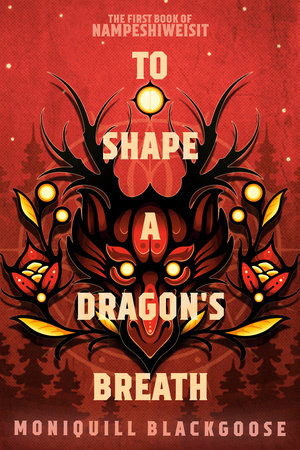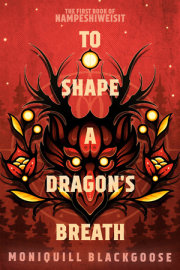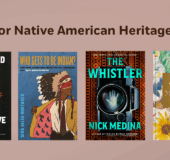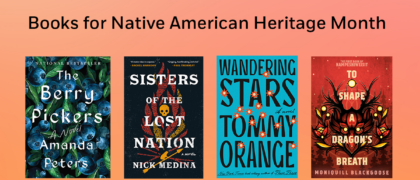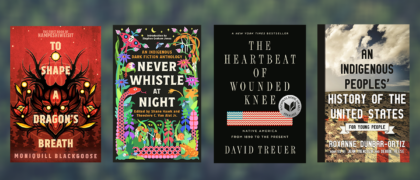I was gathering mussels on Slipstone Island when I saw the dragon.
I’d never seen a proper dragon before, but there was no mistaking it for anything else. It had come walking out of the scraggy stand of pine trees at the base of the temple mound and was standing on the rocky hillside, looking out to sea.
It was red and gold and glorious with the evening sun behind it, like a hillside in autumn. From nose to tail it was twice as long as my canoe, and from wing tip to wing tip three times as long. It had a crown of antlers that must have come to thirty points or more. It stretched its wings, and the sun came through them, showing the scarlet net of its bloodworks. It had a long, sinuous body, like an otter or a fisher. Its neck double-curved like a heron’s. Its mane was bloodred, each spiky feather tipped with black, and it had black markings on its eyes and muzzle and along the rims of its deerlike ears.
For a very long time, it did nothing. It sat poised in the sun with its wings outstretched while I stared, hardly able to breathe. We hadn’t had dragons on Masquapaug since the great dying. Anglish and Vaskosish dragons in Catchnet didn’t count; they’d come later. This was a . . . Nampeshiwe. That was the word for it. The kind of dragon that belonged here.
A seagull screamed, and a pair of them wheeled down to land on my abandoned basket of mussels. I turned to shoo them away, and when I turned back, the dragon was looking at me.
Its eyes were sorrow. Golden, and keenly intelligent, and holding a sadness so howlingly deep that I felt my throat tightening. The dragon looked over its shoulder, back into the trees. Back to where the ruined temple was. It seemed to sigh heavily as it looked at me again.
The dragon turned and leaped off the hillside, falling effortlessly into flight with a few flaps of its enormous wings, gliding away over the surface of the ocean. Eastward, into the darkness of twilight.
In the distance behind me, I heard Sigoskwe call my name.
“Anequs! Anequs, what are you doing?”
A minute later I heard his footsteps thumping on the wet sand.
“What happened?” he asked, panting, as I finally turned to look at him. “What’d you see?”
“A dragon,” I said faintly. “Up on the hill there.” I gestured with a nod to where the dragon had been. “It flew away.”
“What kind of a dragon? Anglish or Vaskosish? Who was riding it?” Sigoskwe asked.
“No. Not an Anglish dragon. A . . . real one. A Nampeshiwe. Nobody was riding it.”
Sigoskwe looked up at me and crossed his arms.
“Nampeshiwe aren’t a thing anymore.”
I shook my head and looked back across the water, where the dragon had gone. Slipstone Island was the easternmost island; there was nothing past it but bits of wet rock fit for seals and then miles and miles of ocean. Where could it possibly be going?
“You’re not kidding, are you?” Sigoskwe asked after a long silence.
“No,” I said, shaking my head. “I saw it.”
“Did you see it or did you
see it see it? Like a vision or something?” He seemed very excited at the idea that it might have been a vision. Having a big sister who had visions would be something worth talking about.
“I think it was real?” I said, no longer certain. “I’ve never had visions before . . .”
“We’ve got to tell Grandma. It’s probably important either way, right?”
“Yes, it probably is,” I said, dragging my eyes away from the waves. “Did you fill your basket?”
“A while ago. I found half a dozen spotted crabs, too.”
“If you found spotted crabs, you’ve been wading out too far.”
“You don’t have to have any crab if you don’t want any,” he said with a shrug. “And it’s not even cold.”
“It’s not June yet,” I said, folding my arms. “If you got caught in a riptide and dragged out to the seal rocks, what would I tell Mother?”
Sigoskwe just shrugged again, looking down at his feet, making a little hill of sand with his toe.
I hauled my basket up onto my hip and threw the strap over my shoulder as we started back to where we’d left the canoe. After we had walked a few minutes, Sigoskwe’s hand slipped into mine. I wondered if he was thinking about dragons, too.
Grandma said that there’d been thousands of them, back before the great dying. Back then there’d been a city on Masquapaug as great as Vastergot or New Linvik. Back then, the temple on the mound on Slipstone Island hadn’t been a ruin.
But then the plague came, and there weren’t enough people and dragons to dance away the storms of autumn, and year by year the city had been washed away into the ocean. The Anglish had come, and the Vaskosish after them, and they’d made war on anyone who was in the way of them building their own cities. Now Masquapaug was part of New Anglesland. Anglishmen came to collect taxes and do folkscoring, and anyone who didn’t do what they said got shot or thrown in jail. It hadn’t happened yet to Masquapaug, but Naquipaug stood as a stark reminder of how useless resistance was.
I smelled corn cakes frying before we came up over the hill to the house, and I could hear Sakewa and some other girls singing a clapping song. Sigoskwe ran ahead to meet them, and Mother was in the doorway with him by the time I caught up.
“I was getting worried about you two,” she said. “Is there something especially interesting on Slipstone Island today?”
“Anequs saw a dragon! A proper one, not an Anglish one! A Nampeshiwe!” Sigoskwe blurted before I had a chance to say it myself. Sakewa and her friends stopped singing and clapping and stared at him. Mother looked at Sigoskwe, then looked at me, her face grave.
“Did you really, Anequs? You’re not playing some kind of game?”
“I’m not, I promise,” I said, swallowing hard. “It was a Nampeshiwe. A red-and-gold one, with great gnarled antlers and black marks on its face. Like the painting on that shield that the sachem has. And its eyes were so
sad, Mother, I can’t—”
“Anequs,” I heard Grandma say from inside, “come and sit by the fire, and tell us this story the way that a story should be told.”
Grandma was sitting by the fire, stitching oyster-shell beads onto the yoke of a dress, running her fingers along the line she’d already embroidered and using the tip of her thumb to measure out the space for the next one. Mother ushered Sigoskwe and Sakewa inside after me. Sakewa’s friends must have gone home, which wasn’t much more than shouting distance away. They’d probably be telling their families what Sigoskwe had said. Mother set the two of them to shucking mussels while I described the dragon.
“It will have been old, to have so many points on its antlers,” Grandma said evenly, after I’d stopped speaking. “A dragon from somewhere on the mainland, maybe someplace west of the sunset even. I wonder if it lost its lands to Anglishmen, like us. You say it had no rider?”
“No, there was no one. Just the dragon, looking so sad.”
“A dragon that old, maybe its companion died,” Grandma said with a long, slow sigh. “In stories, a Nampeshiwe often dies of grief when its Nampeshiweisit dies. You say it flew east? To the ocean?”
“Yes,” I said, feeling my throat tighten and my eyes water. “Into the dark.”
“You won’t see it again, probably,” Grandma said, closing her eyes and shaking her head. “Probably it’s gone to chase lands east of the sunrise.”
There was something in the pit of my stomach when Grandma said that, cold and hard like a stone. It was the same way I’d felt when Mother had told me that Grandpa had died.
“You’re the one who saw the dragon, Anequs,” Grandma said. “Whether it was real or a vision, you should climb the mound on Slipstone Island and offer tobacco and juniper at the temple.”
“I’ll go at first light,” I said, canting my head.
“
My grandmother told me,” Grandma said, “that when she was a girl, the way that dragons came to love people was that people spoke and sang to their eggs, and that dragons hatched already loving someone. In the days when she was a girl, and there were a dozen dragons in her meetinghouse, they’d lay their eggs there to hatch and be named and be welcomed into the people. Whether it was a vision or something real, it’s certainly something that you saw. You saw it alone, so you should go alone to offer thanks for the vision, and then come back and tell us what it’s shown you.”
“We should send Niquiat a telegram about Anequs seeing a dragon,” Sigoskwe said.
Copyright © 2023 by Moniquill Blackgoose. All rights reserved. No part of this excerpt may be reproduced or reprinted without permission in writing from the publisher.

